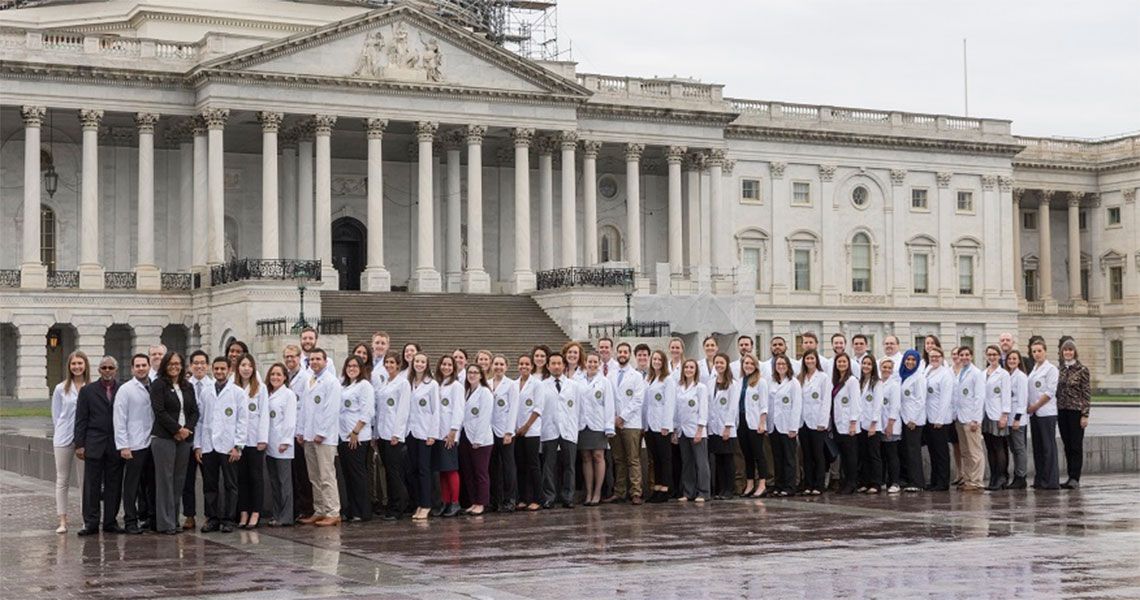In mid-November, physician assistants (PA), faculty members, and students — including those from the George Washington University School of Medicine and Health Sciences (SMHS) PA program — gathered to advocate for the profession as part of the Physician Assistant Education Association’s (PAEA) national meeting in Washington, D.C. Attendees split into their home-state delegations and stormed the Hill to meet with congressional and senatorial representatives and discuss two pieces of legislation designed to smooth and improve the path for potential PA students and educators.
“The PA Higher Education Modernization Act is trying to increase the pipeline by making sure that there’s parity in the loan limits,” said Karen Wright, Ph.D., interim chair, interim program director, and assistant professor of physician assistant studies at SMHS. “PA students in general have limited funding for subsidized loans, so they end up having to get commercial, high-end loans to pay for their PA education. We’re trying to make sure that there’s parity with other health professions students and that they have access to more unsubsidized loan funding. By doing so, more people are more likely to enter PA education.”
The bill also includes loan repayment programs for PAs who serve in areas of need, increased grant funding for PA faculty development, and the modernization of PA program technology.
The second bill, the Physician Assistant Education Public Health Initiatives Modernization Act, is designed to improve diversity within PA programs, fund research in PA education, and ensure PA education programs receive a fair portion of Primary Care Training and Enhancement Program funds.
Ideally, both bills will also tackle the shortage of medical professionals in primary care. As Wright explained, due to high education costs, student loan burdens, and comparatively low salaries in primary care, physician assistants are opting to specialize. Compounding the problem is people are living longer, and with the passage of the new health care law, more Americans are insured and requiring access to preventive and primary care.
As part of the Maryland delegation, Renita Tyler-Richards, a first-year PA student at SMHS, was able to voice her perspective on the needs of a changing PA landscape. “With the primary care shortage, we’d love to go into primary care but the discrepancy of pay between primary care and specialties makes it really hard.”
The reception from the representatives, Tyler-Richards and Wright said, was positive. “They were very open to us and were very appreciative of us taking time out of our schedules to come and see them,” Wright said.
For the students, the opportunity to speak with the representatives and advocate for their profession was invaluable. “I’d never really had any involvement or interaction with government,” said Asaf Singerman, a first-year PA student at SMHS. “It was fascinating to see that and to be able to meet with these representatives and their staff and help educate them on our profession, what we offer to the public as a whole, and how the issues with our education aren’t well understood by the public.”
The PA profession, according to Howard Straker, PA-C, M.P.H., assistant professor of physician assistant studies at SMHS and PAEA board member, is still relatively young, which is why advocacy — and participation in events like PA Hill Day — is crucial. “Most of our advocacy is about educating others: health professionals, health system administrators, policymakers, and sometimes even patients,” he said. “A lot of the advocacy is getting people to understand who we are, what we do, and how we are here to serve patients. The other part of advocacy is how we make changes in the health care system. I think it’s important that the students — just as everyone else — understand the role that we have in looking out for our patients.”
The students, including Tyler-Richards, Singerman, and Sandy Fulkerson Schaeffer, a dual PA and Master of Public Health candidate at the Milken Institute School of Public Health at GW, took that first-hand look at legislation seriously — even if the timing of the visit was right before a big exam.
“At first it seemed like bad timing, but it ended up being good timing because it allowed us all to step back and take a macro perspective of what we’re doing here,” said Fulkerson Schaeffer.
Tyler-Richards agreed: “It’s always easy when you’re in school to wall yourself off from the larger world, but that day really helped to put into focus how when you become a PA, you’re becoming part of a greater profession. You need to be aware of how what we ask for and our rights as a profession are always changing, and we need to be fighting for our rights as a profession. We can’t just put our heads in the ground.”



